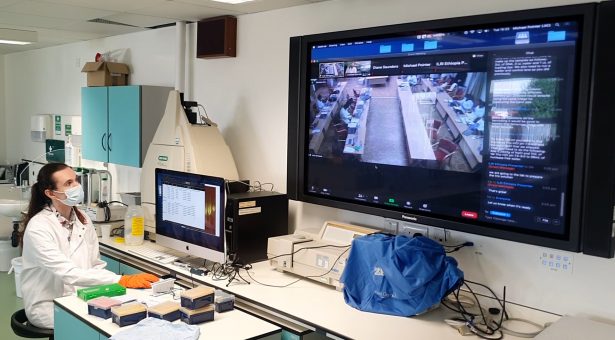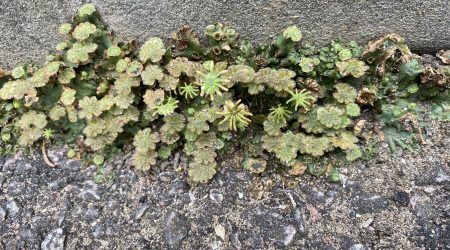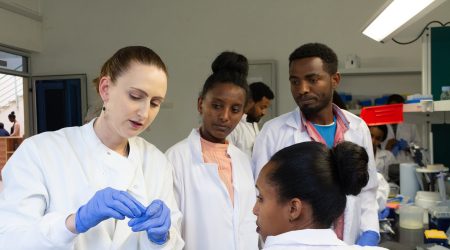Going virtual: MARPLE diagnostics training in the Covid era

To safeguard the roll out of the MARPLE diagnostics method across Ethiopia, this summer Ethiopian researchers congregated in Addis Ababa for the project’s first virtual training workshop.
The workshop, held from 9 to12 August, represented a milestone in what is now possible with remote learning.
MARPLE diagnostics is a new innovative approach for fungal crop pathogen diagnostics developed by Dr Saunders’ team at the John Innes Centre.
The project uses a handheld MinION nanopore sequencer, built by Oxford Nanopore, to analyse samples in the field; reading the pieces of the genome which define the different strains of the wheat rust pathogen. This then provides real-time information about the exact strains present in farmers’ fields.
From the John Innes Centre’s training suite in Norwich, 20 Ethiopian participants in Addis were remotely guided through a highly technical and practical training workshop covering all aspects of the MARPLE diagnostics methodology. Participants were able to successfully run yellow rust field samples through the MinION sequencing protocol and MARPLE bioinformatics pipeline, all in a virtual teaching environment.
Dr Diane Saunders from the John Innes Centre and MARPLE project co-lead said: “This was a phenomenal multi-partner and international capacity building effort. Bringing the latest innovations in plant disease diagnostics for the wheat rust pathogens directly to researchers in the field working tirelessly to combat these devastating diseases”.
In the last decade, new wheat yellow rust strains have emerged that are adapted to warmer temperatures, have expanded their ability to infect different wheat varieties and are more aggressive than those previously characterised causing a serious threat to global wheat production. Improved surveillance and diagnostic systems are essential in responding to the threat of such crop diseases.
Previously, identification of pathogens to the strain level “took a long time”, according to Dr Girma based at the Ethiopian Institute of Agricultural Research: “In the past we were not doing race analysis in Ethiopia, we sent [samples] to Minnesota or to Denmark, and getting results could take months, during which time disease could take hold. To do race analysis here [in Ethiopia], in a couple of days, that would be amazing,” he said.
MARPLE diagnostics – is ideally placed to provide exactly this capacity.
Speaking after the workshop, Dr Dave Hodson (CIMMYT), project co-lead considered it a “fantastic success” and was excited by the “benefits for the future…of showing that you can do a very advanced technical workshop and do it remotely”.
Beyond MARPLE diagnostics, Dr Saunders noted that: “the workshop will also open up new possibilities for researchers in Ethiopia by providing local genome sequencing capacity that is currently absent”.
The workshop was made possible through the contributions of two NRPDTP PhD students, Mike Pointer and Tom Birley, undertaking professional placements for PhD students (PIPS) funded by UKRI-BBSRC Norwich Research Park Biosciences Doctoral Training Partnership. Building on the previous success of in-country workshops, Mike and Tom converted all training material into a format suitable for remote delivery
Chris Darby, Principal Investigator for the John Innes Centre UKRI Agri-tech Catalyst Seeding Award, said: “It’s fantastic to see the deployment of these technologies and foresee the impact that they will have on Ethiopian food security. This work also reinforces the emphasis given by the John Innes Centre to providing international experience for students through the PIPS opportunity. In this instance, the students have achieved real success in a short time period and in the most difficult circumstances”.
What’s next for MARPLE diagnostics?
Dr Dave Hodson highlights the immediate application to the latest pathogen threat: “We believe we have a new race of yellow rust that has come into Ethiopia this year and we are really worried. MARPLE diagnostics will allow us to rapidly diagnose this new race and determine its spread which has big implications in guiding control measures to where they are needed most.”
Reflecting on the MARPLE journey so far, innovation and partnership are its major themes.
MARPLE diagnostics would not be possible without close collaboration between all of its contributing organisations, as well as its many funders, from across the globe. Virtual training is the latest instance of MARPLE providing innovative solutions to tough challenges, a pattern that has marked out the project since the beginning and will continue to be among its strengths as it grows into the future.
MARPLE diagnostics is supported by funding from the UKRI Agri-tech catalyst seeding award, BBSRC Innovator of the Year Award, the CGIAR Big Data Platform Inspire Challenge, the Bill & Melinda Gates Foundation and the Foreign, Commonwealth and Development Office (UK).



